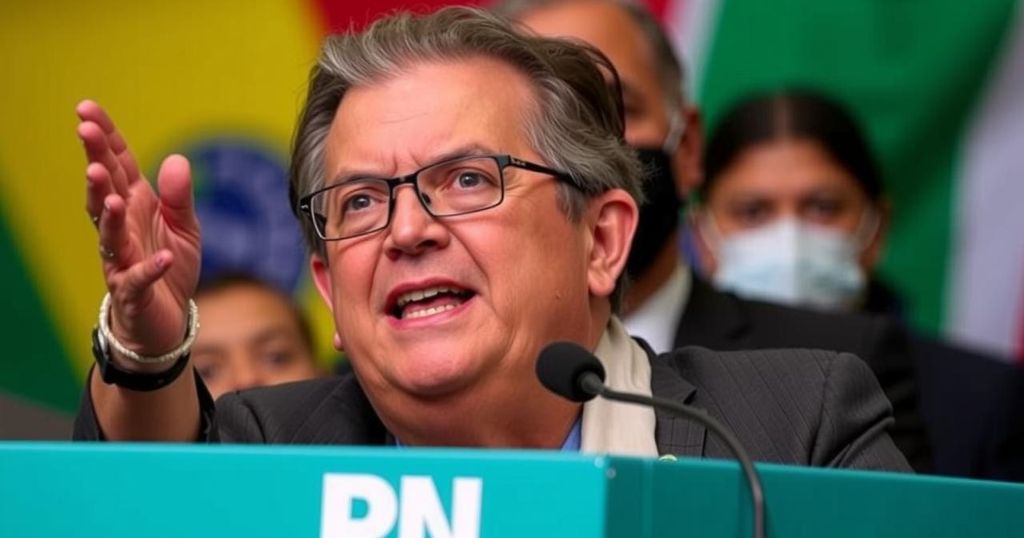Politics
ANDRES MANUEL LOPEZ OBRADOR, ASIA, ASSOCIATED PRESS, BOLIVIA, CONSTITUTIONAL COURT, CORRUPTION, CUBA, DEMOCRACY, EL SALVADOR, ELECTIONS, EV, EVO MORALES, GOVERNANCE, LATIN AMERICA, LOPEZ OBRADOR, LUIS ARCE, MEXICO, NORTH AMERICA, PHILIPPINES, SOUTH AMERICA, THE ASSOCIATED PRESS
Marcus Li
0 Comments
Bolivia’s Judicial Elections: A Study in Political Contestation and Voter Apathy
Bolivia is set to hold a controversial judicial election amidst growing concerns about political influence over the judiciary. Campaigning is prohibited, yet candidates seek visibility through unconventional means. Voter apathy prevails as many view the system as dysfunctional, fearing the elections may further politicize the judiciary. This election has implications beyond Bolivia, with scrutiny from regional leaders amid a backdrop of judicial reforms in Latin America.
Bolivia is preparing for a controversial judicial election this Sunday, where voters will choose judges for the Constitutional Court in an environment rife with skepticism. Though campaigning is officially prohibited, some candidates have been seen discreetly associating their images with consumer products, reflecting a desperate need for public recognition amid a convoluted ballot. Bolivia remains unique globally for its practice of electing top judges, a process reintroduced in 2009 under former President Evo Morales, despite concerns about its effectiveness and democratic implications.
Recent events have intensified scrutiny surrounding these elections, particularly concerning the involvement of the Constitutional Court, which is perceived to be partisan and supportive of the current administration led by President Luis Arce. Voter apathy is a significant issue, as many citizens regard these elections as mere political theater rather than a genuine effort to ensure judicial integrity. This sentiment is echoed by the vice president of the electoral tribunal, Francisco Vargas, who remarked on the growing contentiousness of the voting process.
Historically, previous judicial elections in Bolivia have been fraught with transparency issues, leading to considerable public disillusionment. A lack of public trust in the candidates discourages participation, leaving many to express indifference or consider arbitrary methods for voting, as stated by voters like architecture student Marisol Nogales. With this election being only a partial one—four of the nine seats are contested—critics warn it may further entrench the undue influence of ruling political factions on the judiciary.
As Bolivia approaches this pivotal vote, the implications extend beyond its borders, attracting attention from regional leaders, particularly in Mexico, where similar judicial reforms are underway. The outcome may provide insight into the risks associated with politicized judicial systems, which have been criticized for undermining democratic foundations throughout Latin America. With escalating tensions between political factions, the electoral process is positioned to impact not only the judiciary but also the political landscape in the lead-up to Bolivia’s 2025 presidential election.
The practice of electing judges in Bolivia, established over a decade ago, was intended as a reform aimed at increasing democracy in the judiciary. However, it has resulted in a politicized system that critics argue detracts from judicial impartiality and integrity. This controversy comes on the heels of delays in the electoral process as political maneuvering between President Luis Arce and former President Evo Morales influences the timeline and circumstances surrounding the vote. Regional and international observers are keenly monitoring the developments, which may foreshadow similar reforms elsewhere, notably in Mexico under President Claudia Sheinbaum.
In conclusion, Bolivia’s upcoming judicial election reveals the complexities and potential pitfalls of electing judges in a politically charged atmosphere. The public’s disillusionment and skepticism towards these elections highlight the risks of merging judicial appointments with political interests, potentially undermining the rule of law. With the eyes of the region fixed on this unfolding situation, Bolivia’s experience may serve as a cautionary tale for similar reforms in neighboring countries, emphasizing the importance of maintaining judicial independence in the face of political pressures.
Original Source: www.voanews.com




Post Comment